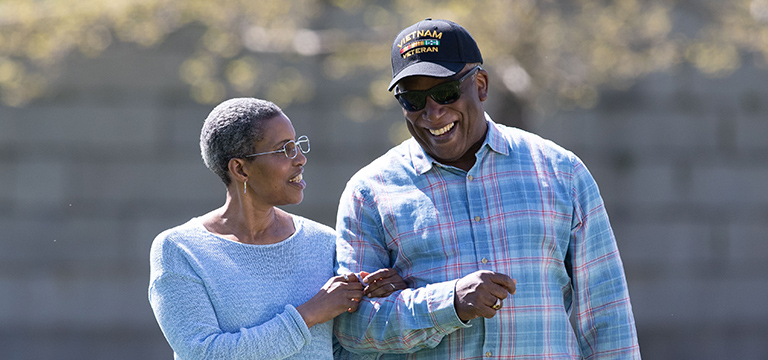A new beginning
Retiring from service is an exciting time in your life. After years of honorable service, you’ll have the freedom to follow your passion, whether that’s developing a hobby, traveling, going back to school or starting a second career.
But transitioning from the uniformed services is a big change that affects many different aspects of your life. One example is choosing a vision plan. When you’re in the uniformed services, your vision coverage isn’t something you usually need to worry about since it’s covered under TRICARE. Having vision coverage as a civilian is crucial for maintaining healthy eyes and your overall health.
Get a retirement physical
You’ll receive a retirement physical at least six months before your terminal leave or retirement. This will make sure you’re healthy and receive any necessary treatment before going into civilian life. It’s important to take advantage of your TRICARE benefits while you’re still on active duty and get any vision care you may need, including an exam and vision test. Be sure to make a few copies of your vision records so you have them easily accessible.
Create a plan
Start thinking about your retirement plan at least 90 days before retiring. Here are some things to keep in mind:
- Know your individual vision options
- Discuss your plans with your significant other
- Take inventory of your financial assets and needs
- Talk to a financial planner
- Evaluate you and your family’s current and future health needs
You’ll also want to take a look at your health needs. What’s important to you when seeking vision care? Plans offer different levels of coverage for different needs. Finding the right one for you and your family will help ensure you get the benefits you need within your budget.
Take a look at your options
The Federal Employees Dental and Vision Insurance Program (FEDVIP) is a supplemental dental and vision benefits program available to federal employees, retired federal employees, retired uniformed service members and their families as well as the families of active duty service members.
Uniformed service members, spouses and dependents may enroll between 31 days prior to the military retirement date and 60 days after. If you don’t enroll in that window, you’ll need to do so during the annual Open Season period, which is typically the second Monday of November through the second Monday of December each year.
FEDVIP offers five different vision insurance carriers to choose from, including Blue Cross Blue Shield FEP Vision. Based on your needs and budget, BCBS FEP Vision has two plan options. To help you see which one is right for you, try the AskBlueSM BCBS FEP Vision Plan Finder. All you have to do is answer a few questions about your vision care needs, including:
- Your future vision care needs
- Your eyeglass frames and lens treatment needs
- Your contact lens needs
- How much you want to spend
It only takes a few minutes to get a plan recommendation and you do not need to register or sign up for anything.
No matter which option you choose, you can have peace of mind knowing BCBS FEP Vision provides quality vision benefits, including fully-covered comprehensive vision care exams, a frame allowance and it’s accepted at over 144,000 independent providers and national retailers.
To learn more about the FEDVIP vision plans available or to enroll in a plan, you can visit BENEDEDS.com or call 877-888-FEDS.
Planning care in retirement
Once you are enrolled in a vision plan, you can start caring for your eyes. On active duty, you had eye exams scheduled on your behalf. In retirement, you’ll need to schedule your own vision care exams. It’s recommended you get a vision care exam completed soon after retirement. During this exam, your optometrist will perform visual acuity tests to assess the sharpness of your vision and cover tests to assess the alignment of your eyes. They will also perform glaucoma tests to check the pressure in your eyes and might dilate your pupils to get a better look inside your eyes. Talk with your optometrist about how often you should be getting vision care and what corrective vision options are needed, if any.

